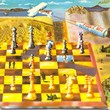|
|

Speakers' corner: Peter Hammill Following up our retro scope series of 2006 and 2007, 2009 and 2010 - here's the ever-continuing, never-stopping New Speakers' corner! Luna Kafé's focused eye on great events, fantastic happenings, absolute milestones, or other curious incidents from the historic shelves/vaults of rock. This moonth's piece takes us 40 years back, to the summer of 1971. Summer of 1971? The 60s were definitely over and gone, and... what happened then? Well, in June the first Glastonbury Festival (in England) took place, and the Fillmore East in New York City closed down. Then Hammill's 'two-movement checkmate' appeared, as Fool's Mate "...is the quickest possible checkmate in the game of chess". It's said that: "...even among rank beginners, the mate almost never occurs in practice." (source: wikipedia). Or, is it a Tarot card reference? Anyway, here's Hammill's solo debut game.
Peter Hammill July doesn't seem to be the month for releasing albums. Not many greats to choose from July 1971, 81 or 91 that I have found. The only real contender for this little oddity was Fireball by Deep Purple. We might return to it in ten years time... By 1971 Peter Hammill's band Van der Graaf Generator (VdGG) was well established with one neglected and two acclaimed albums under the belt. It seems strange that the band's vocalist, main writer, guitarist and occasional pianist would want to spend time to revisit songs he had written 3-4 years prior and by now seemed unappropriate for the band. Fool's Mate includes 12 quite simple, more or less pop songs of many flavours that last between two and a half and four and a half minutes. The following VdGG album Pawn Hearts, recorded a few months later, only included three tracks, the shortest more than ten minutes long. Well, the reason for recording Fool' Mate must have something to do with the strength of the songs, then. Most of them were written by Hammill in the spring or summer of 1967 before he left for university in Manchester. There he met Chris Judge Smith and the pair formed VdGG during the autumn. And the two of them wrote two of the songs here soon after. Peter says in the sleeve-notes of the album that it is a return to his roots. The songs are to some extent influenced by the time they were written. Quite a few flavoured by the summer of love, both about the unhappy kind and at least two ecstatically happy ones called precisely "Happy" and "Sunshine". There is still a fresh scent of the innocence of the 60s hanging over the album although it includes more serious and early 1970s arrangements, too. I'm sure the album would've sounded more innocent and would no doubt be less richly and elegantly equipped if it had been released in 1968. There's a handful of notable guest musicians involved here, that Peter hardly knew until around the turn of the decade. The album opens with a few characteristic guitar notes by one Bob Fripp before we are elevated by the "Imperial Zeppelin". This is quite a hectic airship ride. David Jackson of VdGG puts his distorted trademark sax-stamp on the tune, but it is first and foremost driven by an almost honky tonk piano and a hilarious organ, especially towards the end, by VdGG keyboardist Hugh Banton. The backing vocals are pretty hilarious, too. I'm quite sure that Judge was the main surce for this. He developed his interest in airship disasters in later years, culminating with the release of his vast songstory Curly's Airships in 2001. "Candle" is quite the opposite, reflective and given a push in direction of folk by the excellent mandolin of Ray Jackson from VdGG's lable- and tourmates Lindisfarne. The aforementioned "Happy" is baroque'n'roll with a spinet-sounding piano and Bach-alike organs. David Jackson's flute lifts it even higher. "Solitude" is close to VdGG of the 1971 era apart from Ray Jackson's harmonica that pops up all over the place. Despite the innocent theme about nature it sounds occasionally eerie with a haunting guitar and distorted voice. There are two classic Hammill piano ballads involved. "Vision" is the most spine chilling: 'A vision shimering, shifting, moving in false firelight; a vision of a vision, protecting me from fear at night...' It is still featured on Peter's solo live repertoire now and again. "The Birds" is to some extent pushed into jazz terrain thanks to the great piano playing by Hugh and ditto guitar by Robert Fripp. The sublime bass by former VdGG-member Nic Potter also has to be mentioned. "Re-Awakening" alternates between 1967 and 1971 in a fascinating way. The 71 bits could easily fit into side 2 of the Pawn Hearts LP. "Summer Song In The Autumn" also nods in direction of VdGG of 1971 with organ and piano by Hugh up front. One of the highlights of the album. One might expect "Viking" to be of the noisy extrovert kind, but no. It's remarkably restrained but takes off a little bit off towards the end. Another goodie and a great instrumental part, not least due to the guitar efforts of Bob Fripp. "Child" and "I Once Wrote Some Poems" are the guitar ballads of the album. The former, of the emotional kind, is maybe a bit too emotional for its own good, whereas the latter move into harsher terrain and ends the album with some Fripp guitar notes of the same ilk that opened it. The cover painting also has to be mentioned. It's Paul Whitehead who illustrated several of the early Charisma albums including the earliest by VdGG and Genesis. The chessboard surely depicts a fool's mate situation. And if you look closely, it also illustrates several of the songs of the album, maybe all of them. And there at the back, a young and smiling Peter Hammill peeps up from a hole in the ground. Well, he doesn't look like a hobbit. Probably the most amazing issue about the album is it was recorded in only two days, in between VdGG touring, in April 1971. It was mixed in only two days, too, later in the same month. The quick recording process has made it a spontaneous album that has stood the test of time. The musicianship is splendid throughout and the songs are great with a couple of exceptions. It sounds different from all Hammill's following fourtysomething solo albums with more guest musicians and different kinds of songs. It's perhaps the last breath of fresh air from the sixties? Copyright © 2011 JP
|
| © 2011 Luna Kafé |

